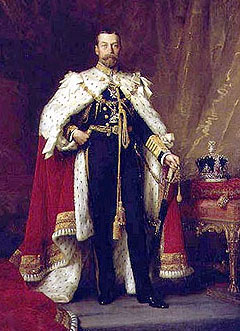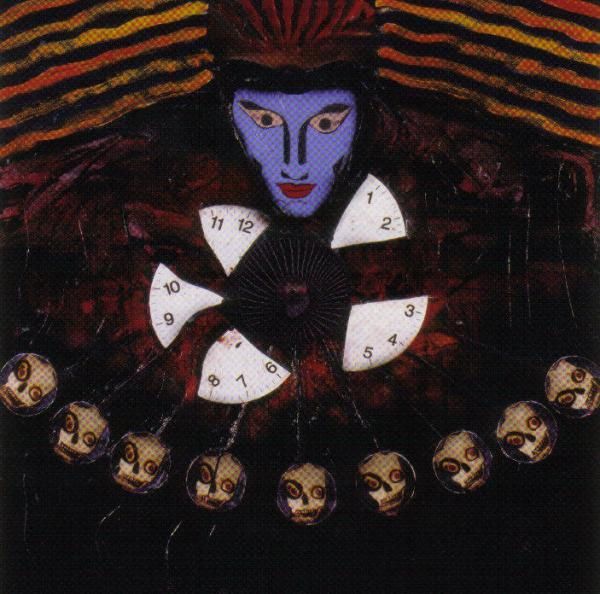
Today marks the 71st anniversary of the death of
King George V, who reigned as King of Britain and 'King-Emperor' of India from 1910 until his death in 1936. Born on 3 June 1865, his official biographer gives a good insight into what he was like as a young man: 'He did nothing at all but kill [i.e. shoot] animals and stick in stamps.' In 1901,
Queen Victoria died, and George's father, Albert Edward, ascended the throne as King Edward VII, and when he died in 1910, George became King George V.
In 1911, the new King and Queen travelled to India where they were presented to an assembled audience as the Emperor and Empress of India. In India, George took the opportunity to indulge in hunting tigers, shooting 21. On 18 December 1913 George shot over a thousand pheasants in six hours at the home of Lord Burnham, later acknowledging that 'we went a little too far' that day. Perhaps so.
The outbreak of World War I was difficult for the Royal Family, as they were kind of on the 'wrong side'. George had many German relatives and the family name was Saxe-Coburg-Gotha. The German Emperor Wilhelm II was the king's first cousin, 'Willy.' The King had brothers-in-law and cousins who were British subjects but who bore German titles such as Duke and Duchess of Teck, Prince and Princess of Battenberg, Prince and Princess of Hesse and by Rhine, and Prince and Princess of Schleswig-Holstein-Sønderburg-Augustenberg. It is not therefore surprising writer H G Wells wrote about Britain's 'alien and uninspiring court'.
King George V's first cousin was Russian Tsar Nicholas II (their mothers - Queen Alexandra of the United Kingdom and Empress Maria Fyodorovna of Russia - were sisters)and when so the Tsar was overthrown in the Russian Revolution of February 1917, it came as a bit of a shock. The British Government offered asylum to the Tsar and his family but worsening conditions for the British people, and fears that revolution might come to the British Isles, led George to think that the presence of the Romanovs might seem 'inappropriate' under the circumstances. However, they decided in 17 July 1917 to change the name of the British Royal House from the German-sounding House of Saxe-Coburg-Gotha to the House of Windsor.
During and after World War I, many of the monarchies which had ruled most European countries fell. In addition to Russia, the monarchies of Austria, Germany, Greece, and Spain also fell to revolution and war, although the Greek monarchy was restored again shortly before George's death. Most of these countries were ruled by relatives of George.
To get some idea of how his subjects came to view King George's time in power, it is hard to do better than quote from a 1935 pamphlet -
The Jubilee-and how - written by the British Communist writer
T. A. Jackson to counter the rubbish coming out at the time of the Silver Jubilee held to celebrate twenty five years of King George's reign.
'On May 6th we shall all have a holiday. For most of us this will be without pay; but all of us will be (officially) expected to rejoice! Why?
Because King George the Fifth has kept his job for twenty-five years. To hold a job in a competitive market market for a quarter of a century, is nowadays, no small feat. And although the post of King can hardly be said to fall within the competitive category, there have been in the past twenty-five years so many cases of Kings deposed, dethroned, and otherwise placed on the retired list that we can well understand why King George and all his fans find the occasion one for sincere gratitute and rejoicing.'
After noting the fall of the Kaisers in Germany and Austria, the Tsar of Russia, the Sultan of Turkey, the Emperor of China, the Kings of Bulgaria, Greece, Spain, Portugal, the Shah of Persia and the King of Siam, Jackson notes that the Jubilee was however a 'trade stunt'. 'Selling' Royalty to the Public began with the cunning Disraeli 'advertising' Queen Victoria, which was useful as people needed to be 'persuaded that but for the King and the Royal Family the world would stop spinning on its axis and the British Empire would blow up with a bang!' Queen Victoria was made out to be 'just like us' but at the same time always achieving 'more than we could do' - 'her domestic virtues were exploited to the full...her bourgeois respectability and the piety and diligence of her spouse were of immense importance in the period when all the thrones of Europe were rocking under the impact of the forces generated by the Industrial Revolution.' Victoria was 'a petty bourgeois monarch around which was organised the cult of Empire worship' - becoming Empress of India in 1877 and then Jubilees were organised in 1887 and 1897 to celebrate her reign.
The Jubilee then was not really for the monarch - who had no power - but to 'hide the reality of the capitalist plutocratic dictatorship of Government', a 'Lord Mayor's show on a world scale'. What exactly are we celebrating 25 years of?
George V's reign saw the bloody First World War which left one million British troops dead and a further million wounded - while elections were suspended at home, followed by economic crisis, high unemployment and repression in the colonies. From the Black and Tans in Ireland, the Meerut Trial in India, as well as events in Egypt these years are marked by a fear of nationalist revolution. And now we have seen the rise of Fascism - 'Hitler's "Aryan" dominance myth is simply the practice of British Imperialism' together with 'bogus science and developed to its logical absurdity'. And now we have the new threat of war.
'To celebrate the Jubilee is to rejoice over the fact that whereas the reign began with the British Government in general sympathy with the Tsar and the Kaiser, its twenty fifth birthday finds it in no less sympathy with Mussolini and Hitler' [His successor,
Edward VIII would take 'sympathy' for Mussolini and Hitler to even greater heights]. Jackson noted it is not a question of the personality of the monarch - 'so far as essentials are concerned George V has had no more to do with determining the historical sequence of events and their economic and political outcome than you or I. To blame George V for the present situation at home and abroad would be as foolish as the praise lavished upon him by the press hirelings of capitalist imperialism and by its political mouthpieces'. 'The Jubilee celebrations are deliberately determined to divert public attention - particularly that of the workers from realities to fake issues. They constitute as a whole one elaborate "circus" staged expressly to divert attention from the fundamental rottenness of the social structure for which the British monarchy serves as a single figurehead' - the monarchy is but 'a puppet of Finance State Capital'.
Of the Silver jubilee King George could not really understand why there was so much to celebrate about his reign either, saying in response to the crowd's adulation, 'I cannot understand it, after all I am only a very ordinary sort of fellow.' The shock of war and revolution did seem to take its toll on George's health, which now began to deteriorate. He had always had a weak chest, a weakness exacerbated by heavy smoking. A bout of illness saw him retire to the sea, by Bognor Regis in West Sussex. A myth later grew that the King's last words, upon being told that he would soon be well enough to revisit Bognor Regis, were "bugger Bognor!" In the evening of 15 January 1936, the King took to his bedroom at Sandringham House complaining of a cold; he would never leave the room alive. The King became gradually weaker, drifting in and out of consciousness. The diary of his physician, Lord Dawson of Penn, reveals that the King’s last words, a mumbled "God damn you!", were addressed to his nurse when she gave him a sedative on the night of the 20 January.
Labels: Dead King, history












